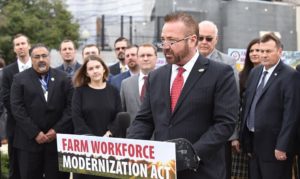Apr 27, 2020Industry leaders, Congress members urge USDA to raise relief limits
On April 23, 154 Members of Congress wrote to President Trump echoing the potato industry’s concerns about the CFAP program payment limits as it relates to assistance for the livestock, dairy and specialty crop sectors.
Currently, the payment limit is set at $125,000 per commodity with an overall limit of $250,000 per individual or entity. Qualified commodities must have experienced a 5% price decrease between January and April. Senators Jerry Moran (R-Kansas) and Dianne Feinstein (D-California) led a bipartisan letter signed by 28 Senators urging USDA to eliminate the payment limits. Representatives Jimmy Panetta (D-California) and Mike Simpson (R-Idaho) led a similar bipartisan letter in the House, which was ultimately signed by 126 Members.

“A strong relief package for the potato industry will involve aggressive USDA surplus purchases combined with direct payments that make a difference,” said RJ Andrus, NPC VP of Legislative and Government Affairs. “Congress and the Administration need to devote more funding and raise these payment limitations to achieve the overall goal of stabilizing family farms.”
In the letters the Members write, “This limitation would severely restrict the program’s effectiveness for many family-owned farms and ranches across the nation. We strongly urge you to eliminate payment limits for livestock, dairy and specialty crop producers before the final CFAP program details are announced.”
The letter continues, “It is critical for USDA to provide a level of support that is responsive to the disaster situation producers are currently facing. As you know, Congress approved $14 billion in the CARES Act to partially replenish the Commodity Credit Corporation and we believe that a significant portion of these dollars should be used to ensure that needs are met, even if the payments must be paid in tranches.”
USDA announces details on Food Box Distribution Program as NPC urges more aggressive purchases
This week, USDA held two webinars to provide details on their new food box distribution program. It will partner with regional and local distributors whose workforce has been significantly impacted by the closure of restaurants, hotels, and other food service entities to purchase $3 billion in dairy, fresh produce and meat. USDA’s Agricultural Marketing Service (AMS) announced the availability funds utilizing an existing commodity procurement infrastructure to streamline and expand delivery of fresh produce and dairy and meat products to non-profit and governmental organizations that can distribute the commodities to Americans in need.
“This announcement is a first step in USDA surplus commodity purchases and needy recipients must be prioritized first in accessing potatoes and other nutritious commodities. However, USDA cannot stop with just servicing food bank demands,” said Kam Quarles, NPC CEO. “Instead they must purchase surplus potatoes in much larger volumes in order to provide options to growers suffering due to the government-mandated food service shutdown.”
USDA will begin with the procurement of $100 million per month in dairy products, $100 million per month in fresh produce, and $100 million per month in meat products (largely focused on poultry and pork). The distributors and wholesalers will then provide a pre-approved box of fresh produce, dairy and meat products to food banks, community- and faith-based organizations and other non-profits serving Americans in need. Products included in the boxes must be 100% domestically grown and processed in the U.S.
There will be four types of boxes: produce, dairy (including fluid milk), meat or a combination of those three items.
NPC is urging USDA to prioritize potatoes with food banks in order to encourage their participation in the program. Additionally, we are asking that purchases of potatoes be made in forms that facilitate movement of large volumes of product to food banks and on to the maximum number of needy recipients possible.
Interested entities may apply for program participation through AMS’s solicitation process. Invitations to submit proposals are expected to be issued within two weeks after the notice is officially posted on Monday, April 27. For more information click here.
Farm operations included in new small business relief package
On April 23, the House passed an interim $480-plus billion COVID-19 small business relief package (dubbed “CV-3.5”) by a vote of 388-5. The Senate had previously passed the legislation on April 21 by voice vote. The bill was signed into law by the President April 24.
The package includes:
- $310 billion in new Small Business Administration (SBA) Paycheck Protection Program (PPP) funding; and,
- $50 billion for the SBA’s Economic Injury Disaster Loan (EIDL) program, which will allow approximately $300 billion in loans to small businesses.
Notably, the bill now allows agricultural enterprises to qualify for the EIDL program. Farmers can apply for both PPP and EIDL, but funds cannot be used for the same purpose.
WOTUS rule finalized
The EPA and Army published the final Navigable Waters Protection Rule to define “waters of the United States (WOTUS)” earlier this week. Under the rule, four categories of waters are federal regulated:
- The territorial seas and traditional navigable waters;
- Perennial and intermittent tributaries to those waters;
- Certain lakes, ponds, and impoundments; and
- Wetlands adjacent to jurisdictional waters.
The rule also details 12 categories of exclusions such as features that only contain water in direct response to rainfall (e.g., ephemeral features), groundwater, many ditches, prior converted cropland and waste treatment systems.
NPC has fought for the removal of unnecessary federal burdens on our nation’s water, such as rules regulating ditches on private farms that are generally dry throughout the year. The final WOTUS rule avoids those negative outcomes and provides increased clarity regarding the responsibilities of farmers under the Clean Water Act in protecting our nation’s surface water resources.







